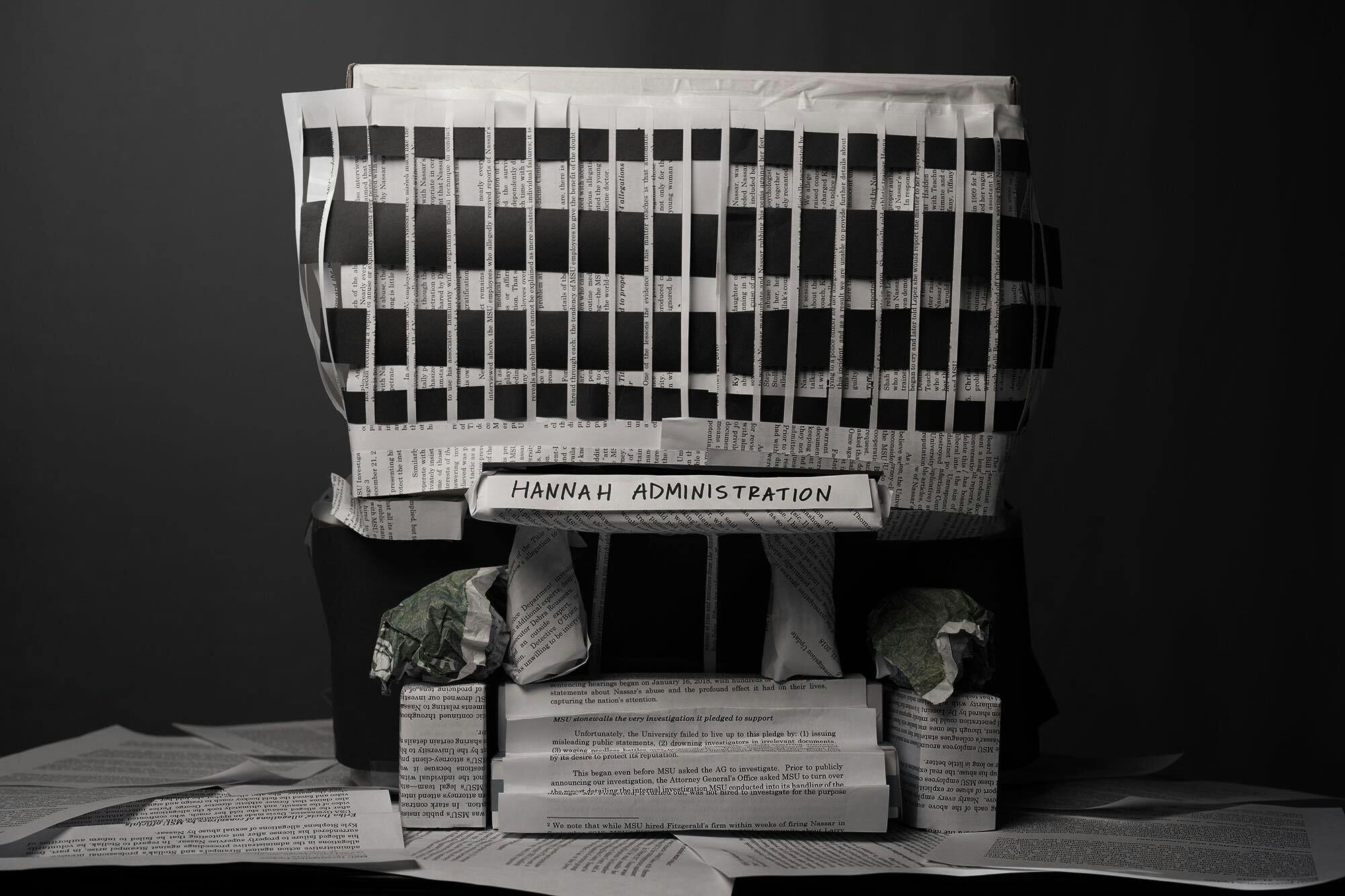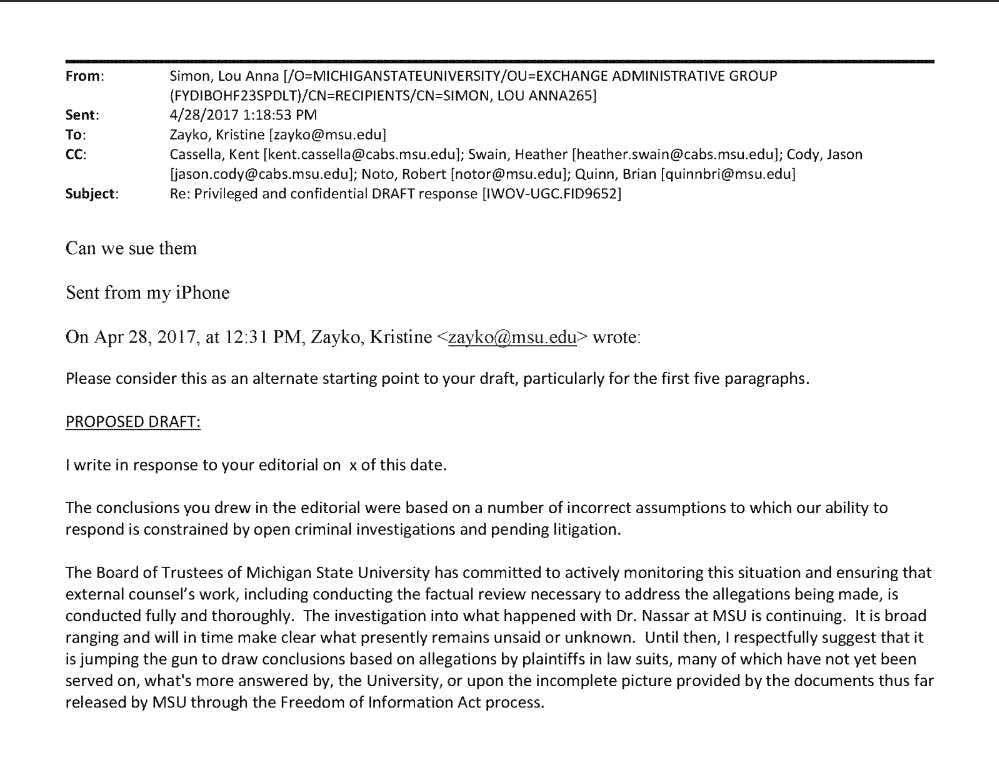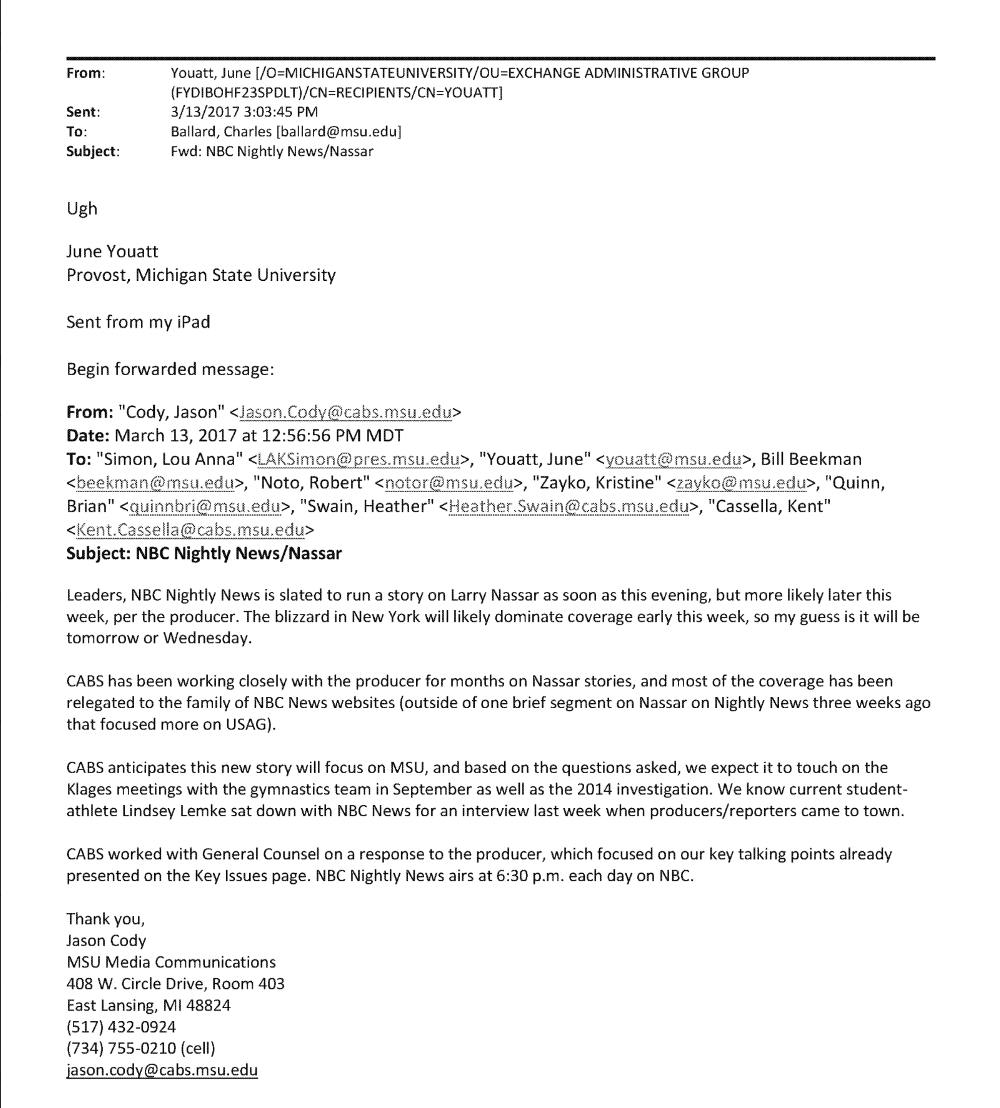Michigan State University was in a "war," its top lawyer believed.
Its cause? Save the university’s image and prevent a massive settlement.

Photo by Brendan Mullin. Created by Zachary Balcoff.
Michigan State University was in a "war," its top lawyer believed.
Its cause? Save the university’s image and prevent a massive settlement.
Its enemy? The hundreds of women, represented by a cadre of brash attorneys, about to sue MSU over years of unchecked sexual abuse by one of its doctors, Larry Nassar.
The conflict could only be won, then-general counsel Robert Noto wrote, "by the opponent's loss of will to fight, by a lack of support on the home front, a desire to move on to other things," or "by overwhelming defeat on the battlefield or strategic error."
"We are going to have to take a lot of punishment before we can dish a lot out … this is going to be a lot like the fight in a 'Rocky movie,'" he wrote in a 2017 "thinking paper," which was publicly released for the first time last week by Michigan’s Attorney General, among thousands of other long-secret MSU documents.
To see the Nassar crisis through those documents — written by people who believed their communications would never be publicized — is to view it through a wholly new lens.
In statements from survivors, and years of memoranda from the various law enforcement, regulatory and legislative investigations, MSU has been a villain in the Nassar affair: criticized for enabling Nassar for so long.
But in these documents, MSU’s lawyers and leaders seem to see a completely different landscape. In their framing, the university is a victim facing unfair attacks from every direction.
As they put it, survivors are dangerous liabilities who require constant oversight, able to create a crisis with each new allegation. Their attorneys are "ambulance-chasers," manipulating their clients to serve their greed. The press is their "willing ally," hungry for anything that skewers MSU. The various investigators are a foe to outmaneuver, and a source of constant stress.
There were moments when some questioned the war-games, but they were scarcely acknowledged. As Noto said of the metaphorical battlefield, "if we are not willing to live with that dynamic, it would be wise to throw in a towel…"
Reached for comment, MSU denied that a similar tone is currently used when discussing issues of sexual violence. "This has not been my experience while working at MSU," spokesperson Emily Guerrant said.
‘Large egos’
University counsel held a deep disdain for many of the attorneys who brought survivors’ lawsuits against MSU, internal communications reveal.
Attorneys were described as "arrogant," "aggressive" and "impolite." Some had "large egos." One Lansing attorney was "unreasonable at times" and had been known to "push the ethical envelope," university counsel wrote.
Their lawsuits were seen as distasteful cash-grabs. Press conferences were described as "grandstanding."
John Manly, a California attorney who represented hundreds of Nassar survivors, was a particular source of frustration.
When Manly criticized the university for only offering "cheap PR words" to those affected by Nassar’s abuse at a press conference, university spokesperson Jason Cody texted a colleague, "Guess him and I aren’t buddies."
"He's a jerk," Deputy General Counsel Kristine Zayko responded. "You must be doing a good job if he’s mad at you."
When Manly wrote a blistering email saying his clients distrusted a new fund for survivor therapy — comparing the university to the Catholic Church — some of MSU’s lawyers reacted with snark.
"I'm going to start taking bets on how quickly he responds to emails in the future," Miller Canfield attorney Scott Eldridge wrote to colleagues. "He just can't help himself. He's predictable if nothing else."
Support student media! Please consider donating to The State News and help fund the future of journalism.
In another exchange, Noto called Manly "impolite" for requesting that an additional university representative join a scheduled meeting with him.
Manly, in an email to The State News, wrote, "For the record, I am impolite to people in positions of authority who protect pedophiles."
Eldridge also ridiculed Andrew Abood, another prominent attorney for survivors, for attempting to "plug (his) new restaurant/bar in town" in a radio interview about MSU’s role in Nassar’s abuse. (Abood could not be reached for comment).
The more ‘sensational’ the ‘better’
As Noto put it in his "thinking paper," the press were plaintiffs' attorneys' "willing ally or easy dupe."
"The more sensational the charge the better for the press…" wrote Noto, who declined to comment.
Throughout the documents, administrators appear to feel victimized by what they saw as a news media unfairly capitalizing on their own struggle and printing anything to grab readers’ attention, regardless of its journalistic integrity.
"Can we sue them."
Such was former President Lou Anna Simon’s blunt question to university counsel in reference to the Washington Post, which had recently published an editorial criticizing MSU for its handling of Nassar.
Emails show that lawyers and MSU administrators were upset with the piece, and quickly began working on a response to the newspaper.
The editorial was based on "incorrect assumptions" and drew conclusions without providing time for litigation and independent and internal investigations to complete their work, they wrote.

Another story that drew ire from MSU was an ESPN "Outside The Lines" special called "Michigan State secrets extend far beyond Larry Nassar case."
The article claimed to have uncovered a widespread pattern of inaction with regards to sexual violence, and cited allegations of sexual assault in the basketball and football programs, under the watch of "MSU’s most recognizable figures," former football coach Mark Dantonio and basketball coach Tom Izzo.
The perceived false equivalence between the coaches and Nassar was a particular point of contention in a draft of a letter MSU planned on sending to ESPN contesting the integrity of the piece.
"Your insinuation that coach Tom Izzo and Mark Dantonio have anything to do with the Nassar situation is ‘Outside the Lines.’"
The letter also suggests ESPN was in no position to report on mishandling of sexual abuse given its own record.
"ESPN as an organization has had numerous recent issues with employees accused of sexual assault, sexual harassment and discrimination, I would think you would have a heightened level of sensitivity to these issues and that would be reflected by a more accurate level of reporting," the drafted letter said. "Unfortunately, that has not occurred."
Communications directors also poked fun at reporters, saying one was working on their "investigative pulitzer" and trying to "outdo IndyStar," in reference to the outlet whose report on Nassar’s sexual abuse set off the scandal in 2016.
Over time, the attitude among administrators towards harsh media coverage devolved into helplessness.
In March 2017, for example, a spokesperson warned administrators that NBC Nightly News was about to air a segment on MSU’s handling of Nassar’s abuse, which featured a sit-down interview with a current student-athlete.
In response, then-Provost June Youatt simply wrote: "Ugh."
